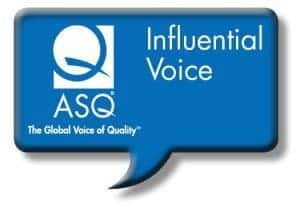 In this month's ASQ blog post, their CEO Paul Borawski writes a new post “The Intersection of Quality and Social Responsibility,” where he defines Social Responsibility succinctly as “Doing well by doing good.”
In this month's ASQ blog post, their CEO Paul Borawski writes a new post “The Intersection of Quality and Social Responsibility,” where he defines Social Responsibility succinctly as “Doing well by doing good.”
One reason I have always been attracted to “Lean” and the Toyota management systen is that it's not just a bunch of technical tools or statistical methods. It's about people and it's about leadership.
One of the two core principles of The Toyota Way, along with “continuous improvement,” is the idea of “respect for people.” Toyota extends this to mean not just their employees, but everybody in their ecosystem: suppliers, customers, community, environment. Is Toyota perfect? No, but they aim high. They set long-term goals of creating cars that cause zero environmental harm, using as little energy as possible. Is Toyota a perfect company? No. Will they reach their goals overnight? No — but they are working at it.
Much of Toyota's approach comes from the idea of focusing on the long term, which is principle #1 of the Toyota Way's 14 principles. Having a long-term “constancy of purpose” is an idea they learned from Dr. W. Edwards Deming, who taught managers to treat employees as individuals and as adults with intrinsic motivation, as opposed to viewing them as “resources” to be forced into actions through “carrots” or “sticks” as many companies will do.
Reducing waste and treating people with respect has strong ties to social responsibility. When I met Masaaki Imai last month (who learned directly from Toyota's Taiichi Ohno) said that “Lean leads to Green” – that environmental improvements are a perfect and natural extension of the Lean approach. I've seen this happen in the lab at Children's Medical Center Dallas. Once staff members were engaged in process and quality improvement, their natural initiative and interests brought them quickly toward making changes that impact that broader environment (including more recycling, etc.)
When an organization is ruled in a top-down “command and control” way by a few people (or one person) at the top of an organization, there's a risk that the leaders are jerks who don't care about their communities or the environment. When the workplace involves everybody and is less command and control, I think we're more likely to see organizations that show a greater concern for external stakeholders.
As Paul says, this is about “doing well by doing good” – in the long term. How many companies have damaged the environment or caused societal harm by putting the short term over the long term? Lean management and the Lean philosophy will lead to more responsible organizations – as opposed to those supposedly “great manufacturers” who push their production to prison-like factories in China (because it's a bit cheaper) or an organization that covers up horrific child abuse because it seemed somehow expedient in the short-term (as my friend Chad Walters wrote about here).
We can do the right things – and we'll be stronger in the long-term, even if we struggle a bit this quarter or this season.
Has Lean thinking led to an increase in social responsibility in your organization?
 Disclaimer: I'm part of the ASQ Influential Voices program. While I receive an honorarium from ASQ for my commitment, the thoughts and opinions expressed on my blog are my own.
Disclaimer: I'm part of the ASQ Influential Voices program. While I receive an honorarium from ASQ for my commitment, the thoughts and opinions expressed on my blog are my own.
What do you think? Please scroll down (or click) to post a comment. Or please share the post with your thoughts on LinkedIn – and follow me or connect with me there.
Did you like this post? Make sure you don't miss a post or podcast — Subscribe to get notified about posts via email daily or weekly.
Check out my latest book, The Mistakes That Make Us: Cultivating a Culture of Learning and Innovation:










I am in Nigeria and spend a lot of my time preaching the benefits of getting all your assets(people) involved and engaged in improving anything possible about your organization. This in turn improves morale, and the bottom line, reduces waste. I can see how after a point, some will begin to tackle the environmental issues. Great post.
http://espn.go.com/college-football/story/_/id/8191027/penn-state-hit-60-million-fine-4-year-bowl-ban-wins-dating-1998
Indeed. It’s too bad the “leaders” at Penn State didn’t do the right thing. Had they not covered up Sandusky, this would have been a “Jerry Sandusky” scandal that could have happened basically anywhere. But, it became a “Penn State” scandal (the university, not just the football program).